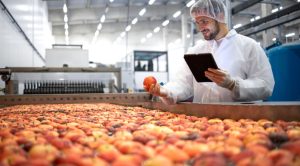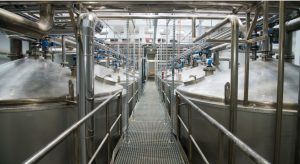The food processing industry is a cornerstone of the UK economy, providing jobs, supporting the agricultural sector, and catering to evolving consumer demands.
If you’re considering starting a food processing business in the UK, a comprehensive business plan is your essential roadmap to success. This guide will walk you through the critical steps to create and execute a winning food processing business plan.
What Is the Current State of the UK Food Processing Industry?

The UK food processing industry is a vital part of the national economy, contributing billions of pounds annually and employing a significant portion of the workforce.
As one of the largest manufacturing sectors, it transforms raw agricultural products into value-added goods ready for consumer markets. The sector serves both domestic and international markets, making it a crucial player in global trade.
Key Trends and Opportunities
- Consumer Preferences: There’s a growing demand for healthier, organic, and plant-based products. As consumers become more health-conscious, startups have the opportunity to cater to this trend by innovating their product lines.
- Sustainability: Environmental concerns have led to a focus on eco-friendly packaging and waste reduction. Businesses aligning with sustainability goals are finding favour with both regulators and consumers.
- Technological Advances: Automation, AI, and IoT have revolutionised food processing, enabling efficiency, cost reduction, and enhanced product quality.
Challenges in the Sector
- Regulatory Compliance: Strict food safety and hygiene standards can be complex to navigate.
- Supply Chain Vulnerabilities: Brexit and global disruptions have led to supply chain instability, increasing costs and delays.
- Competition: Established players dominate the market, requiring startups to find unique niches.
Understanding these dynamics helps entrepreneurs identify opportunities and mitigate potential risks.
Why Is a Food Processing Business Plan Crucial for Success?

A food processing business plan is not just a formality; it’s the backbone of your entrepreneurial journey. It provides a clear roadmap for your business operations and ensures that every aspect of the venture is carefully planned.
Key Benefits
- Strategic Direction: A business plan defines your goals and the steps to achieve them. It aligns your team’s efforts towards common objectives.
- Investor Appeal: Investors and financial institutions require a detailed plan to assess the feasibility and profitability of your business.
- Regulatory Alignment: In the UK, strict regulations govern the food industry. A business plan helps ensure compliance with hygiene, safety, and environmental standards.
- Risk Management: By identifying potential challenges early, such as competition and supply chain issues, you can plan effective solutions.
Business Plan Essentials
- A comprehensive business plan outlines not only your vision but also practical strategies to tackle market demands, operational challenges, and financial risks.
- It serves as a living document that evolves with your business, helping you adapt to changing market conditions.
What Are the Key Steps to Create a Food Processing Business Plan?

A detailed business plan is essential to navigate the competitive landscape of the UK food processing industry. Each step helps ensure your venture is strategically and operationally sound. Below is an in-depth breakdown of the key steps to craft a robust food processing business plan.
Step 1: Executive Summary
The executive summary is the first section but should be written last, as it summarises your entire business plan.
Purpose: Provide a snapshot of your business idea to capture the attention of stakeholders, especially investors.
Components:
- Business name and location.
- Overview of products (e.g., frozen meals, snacks, sauces).
- Target audience, such as health-conscious individuals or the retail market.
- High-level financial projections, including startup costs and anticipated profits.
Example: “Our business will provide plant-based ready meals to urban professionals, focusing on convenience and sustainability, with projected revenue of £500,000 in the first year.”
Step 2: Business Objectives and Description
This section dives deeper into your business’s core identity and goals.
Describe Your Business:
- Type of products (e.g., organic, gluten-free).
- Scale of operations (e.g., small-batch production, mass production).
Set SMART Objectives: Ensure objectives are Specific, Measurable, Achievable, Relevant, and Time-bound.
- Example: “Achieve a market share of 5% in the London organic food sector within two years.”
Step 3: Market Analysis
Understanding your market is fundamental to a successful food processing business.
- Industry Trends: Identify current trends, such as demand for vegan or low-calorie foods.
- Competitor Analysis: Research established players in your niche. Analyse their strengths, weaknesses, pricing strategies, and market reach.
- Target Market: Define your audience by demographics (age, income, location) and psychographics (preferences, values).
- Data Sources: Use government reports, industry publications, and surveys to back your findings.
- Outcome: Highlight market gaps your business will address, such as a lack of locally sourced gourmet snacks.
Step 4: Operations and Production Strategy
This section outlines how your business will function daily.
Production Process: Break down each stage of production, from sourcing raw materials to packaging.
Facility Requirements:
- Location and size.
- Necessary permits and inspections.
Equipment Needs: List the machinery and tools required for production, storage, and distribution.
Quality Control: Detail measures to ensure your products meet UK food safety and hygiene standards.
Supply Chain Management:
- Identify suppliers for raw materials.
- Plan logistics for transporting goods.
Step 5: Financial Planning
Financial planning is critical for determining the feasibility and sustainability of your business.
- Startup Costs: Calculate costs for equipment, licensing, facility setup, and initial marketing campaigns.
- Revenue Projections: Predict income based on product pricing, market size, and estimated sales.
- Break-Even Analysis: Determine when your business will start generating profit.
Funding Sources: Identify options like:
- Bank Loans: Traditional financing.
- Grants: Government schemes supporting food entrepreneurs.
- Investors: Pitch your business to angel investors or venture capitalists.
Step 6: Marketing and Sales Strategy
Your marketing strategy determines how your products reach customers.
Brand Identity: Create a compelling brand that resonates with your target market.
- Example: Highlighting sustainability for eco-conscious consumers.
Promotional Channels:
- Social media campaigns.
- Collaborations with influencers.
- In-store promotions or tasting events.
Distribution Plan: Choose between direct-to-consumer (DTC) models, wholesale to retailers, or partnerships with supermarkets.
Step 7: Risk Analysis and Mitigation
Anticipate potential challenges and outline strategies to overcome them.
Examples of Risks:
- Supply chain disruptions.
- Regulatory changes.
- Shifting consumer preferences.
Mitigation Plans:
- Diversify suppliers to reduce dependency.
- Stay updated on regulations to ensure compliance.
- Invest in market research to adapt quickly to trends.
Step 8: Implementation Plan
Turn your ideas into reality with a clear roadmap.
- Timeline: Define milestones for each stage, such as securing funding, completing facility setup, and launching products.
- Responsibilities: Allocate roles to team members or external partners.
- Monitoring: Set up KPIs (Key Performance Indicators) to track progress, such as production output and sales revenue.
By following these steps, you’ll develop a comprehensive and actionable business plan. Each section not only strengthens your strategy but also builds confidence in potential investors and stakeholders.
A well-crafted plan is the foundation for launching a successful food processing business in the UK.
How Can You Secure Funding for Your Food Processing Startup?

Securing funding is one of the most critical steps in launching a food processing business. With significant upfront costs, such as equipment, facility setup, and licensing fees, it’s essential to explore multiple funding options tailored to your needs.
Government Grants and Schemes
The UK government provides various grants and schemes to support small and medium-sized enterprises (SMEs) in the food industry.
Examples:
- Innovate UK grants for technological advancements in food processing.
- Local council grants for sustainable or environmentally friendly practices.
How to Apply?: Research eligibility criteria and prepare a strong proposal outlining your business’s potential impact.
Bank Loans
Traditional bank loans remain a reliable funding source for startups.
- Business Loans: Banks offer specialised loans for equipment purchase, working capital, or expansion.
- Requirements: A comprehensive business plan, financial forecasts, and credit history are essential to secure approval.
Private Investors and Venture Capital
Approaching angel investors or venture capitalists can provide both funding and industry expertise.
- What They Expect?: Investors look for scalable business models, innovative ideas, and solid financial projections.
- Pitch Tips: Highlight your unique selling proposition (USP) and market potential to stand out.
Crowdfunding Platforms
Platforms like Crowdcube and Seedrs allow you to raise funds by engaging directly with the public.
- Benefits: Crowdfunding also builds brand awareness and a loyal customer base.
- Key to Success: A compelling campaign with visuals, videos, and detailed descriptions.
Personal Savings and Family Support
Many entrepreneurs start with personal savings or loans from family and friends. While this is less formal, it’s essential to document agreements to avoid conflicts later.
Tips for Securing Funding:
- Prepare a professional pitch deck summarising your business plan.
- Build strong financial projections, including break-even analysis and ROI estimates.
- Network at industry events and join startup forums to connect with potential investors.
What Legal and Regulatory Requirements Should You Consider?

The UK food processing industry is heavily regulated to ensure public safety and environmental sustainability. Compliance with these regulations is not optional and plays a critical role in your business’s success.
Business Registration and Licensing
- Company Registration: Register your business with Companies House.
- Food Business Registration: All food businesses must register with their local authority at least 28 days before operations begin.
- Health and Safety Permits: Obtain permits to meet workplace safety standards.
Food Hygiene and Safety Regulations
The Food Standards Agency (FSA) enforces strict guidelines to maintain food safety.
- HACCP Plan: Develop a Hazard Analysis and Critical Control Points (HACCP) system to manage food safety risks.
- Employee Training: Ensure staff receive food hygiene training appropriate to their roles.
Environmental and Waste Management Compliance
- Adhere to environmental laws regulating waste disposal, water usage, and emissions.
- Use sustainable packaging materials to meet environmental goals and consumer preferences.
Labeling and Packaging Regulations
- Compliance: Follow regulations on nutritional labeling, allergen declarations, and expiry dates.
- Standards: Ensure packaging complies with British Standards Institution (BSI) guidelines.
Regular Audits and Inspections
Local authorities conduct regular inspections to verify compliance with food hygiene laws. Failing these can result in penalties or closure.
Tips for Compliance:
- Consult with legal experts to ensure your business adheres to all regulations.
- Stay updated on changes to laws and adapt your processes accordingly.
- Use software tools to manage compliance documentation efficiently.
How Do You Set Up an Efficient Food Processing Facility?

Your food processing facility is the heart of your operations. Setting it up efficiently ensures productivity, safety, and quality, which are crucial for success.
Choose the Right Location
- Accessibility: Ensure proximity to raw material suppliers, markets, and transport networks.
- Zoning Laws: Verify that the location meets industrial zoning regulations.
Invest in Suitable Equipment
- Research equipment that matches your production scale, such as mixers, grinders, or packaging machines.
- Consider energy-efficient machinery to reduce operating costs and align with sustainability goals.
Design an Optimal Layout
- Workflow Efficiency: Arrange equipment to minimise movement and maximise productivity.
- Safety Measures: Allocate separate areas for raw materials, processing, and finished goods to avoid cross-contamination.
Ensure Hygiene and Sanitation Standards
- Install adequate handwashing stations, ventilation, and waste disposal systems.
- Use materials that are easy to clean and comply with food safety regulations.
Implement Quality Control Systems
- Develop a robust system to test raw materials and finished products for quality.
- Regularly calibrate equipment to maintain consistency in production.
Prepare for Inspections
- Keep detailed records of processes, cleaning schedules, and maintenance logs.
- Conduct mock inspections to ensure readiness for audits.
What Are the Final Steps to Launch Your Food Processing Business?

After months of preparation, launching your food processing business requires careful execution to ensure a successful start.
Test Your Products
- Conduct quality and taste tests to ensure your products meet consumer expectations.
- Gather feedback from a focus group and make final adjustments.
Assemble Your Team
- Hire skilled staff for production, quality control, marketing, and distribution.
- Provide training to ensure they understand processes and compliance standards.
Finalise Operations
- Complete facility setup and conduct trial production runs.
- Ensure all equipment is fully operational and compliant with safety standards.
Launch Marketing Campaigns
- Leverage digital platforms like social media and email marketing to build excitement.
- Organise product launch events or tastings to attract attention.
Monitor Performance
- Use key performance indicators (KPIs) like sales, customer feedback, and production efficiency to assess initial performance.
- Identify areas for improvement and refine your processes.
Launching your food processing business is just the beginning. Regularly review your strategies, adapt to market demands, and prioritise quality to ensure long-term success.
Conclusion
Starting a food processing business in the UK is an exciting yet challenging venture. With the industry’s immense potential, the key to success lies in meticulous planning, a deep understanding of market trends, and strict compliance with regulatory standards.
A comprehensive business plan not only serves as your roadmap but also helps secure funding, streamline operations, and navigate challenges effectively.
From conducting market research and setting up an efficient facility to adhering to legal requirements and building a strong brand, every step plays a critical role in your journey.
Remember, adaptability is crucial—stay informed about industry developments, consumer preferences, and technological advancements to remain competitive.
By following the outlined steps and maintaining a commitment to quality and innovation, your food processing business can thrive in the UK’s dynamic market. Take the first step today, and turn your entrepreneurial vision into a flourishing reality
Frequently Asked Questions
What are the first steps to starting a food processing business?
Begin with market research, a solid business plan, and compliance with legal requirements.
How much does it cost to start a food processing business in the UK?
Costs vary but typically include equipment, facility rent, and licensing fees, ranging from £50,000 to £200,000.
What licenses do I need for a food processing business?
You’ll need food hygiene certifications, business registration, and environmental permits.
How can I secure funding for my startup?
Options include government grants, bank loans, and private investors.
What challenges are unique to food processing businesses?
Supply chain disruptions, regulatory compliance, and evolving consumer preferences are common challenges.
How can I market my food processing business effectively?
Focus on branding, digital marketing, and building partnerships with distributors.
What should I include in my food processing business plan?
Cover objectives, market analysis, operations strategy, financial planning, and compliance.




